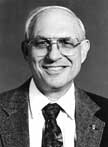by Lee C. Gerhard,
Director and State Geologist

Collapse
of both agricultural and petroleum prices during the first half of 1998
has placed the state’s economy in jeopardy. Yet, American people
on both coasts are rejoicing in low gasoline, pork, and bread prices.
Whenever the prices of food and energy products rise, the government is
quick to intervene, with measures such as windfall profit taxes, but there
is no corresponding reduction in tax and cost overloads when prices sink.
A good share of the problem is the lack of public understanding of the
basis of their standard of living.
Increased urbanization implies a loss of connection with our land and
minerals. People begin to believe that milk comes from cartons found in
grocery stores and electricity comes from holes in the wall. Kansans know
better, because a large share of the Kansas economy is based on energy
and agriculture. How do we educate urban citizens?
One way is to provide schools and teachers with materials from which to teach about resources and society. The Kansas Geological Survey has an extensive public outreach program, as does The University of Kansas Museum of Natural History. However, I was pleasantly surprised to learn how much help is available from the private sector. One example is the Kansas Geological Foundation, a Wichita-based philanthropic group of geologists and industry associates. They provide a library of more than 240 videotapes about resources and earth science, a speaker’s bureau, and an award that annually recognizes an outstanding earth-science teacher in the state (see related article in this issue of The Geologic Record). Efforts such as these, and companion agriculture-education programs, help wage the battle against technical illiteracy and give our kids a better understanding of the world in which we live.

Online February 10, 2003
Comments to: lbrosius@kgs.ku.edu
Kansas Geological Survey
URL:http://www.Publications/GeoRecord/1999/vol5.1/Page2.html